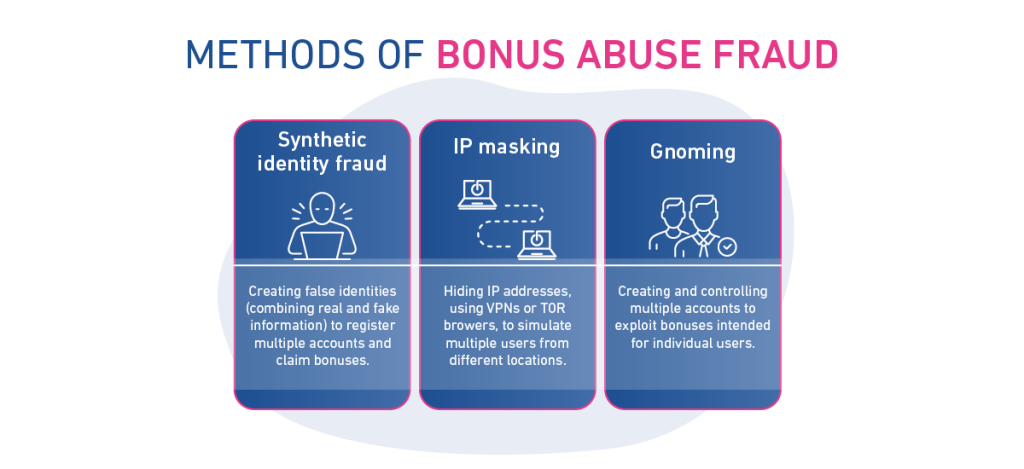Understanding bonus abuse in gamingWhen users take illegitimate advantage of the promotions in gaming, it’s called bonus abuse. Find out what it is and why it matters.
Guide
When it comes to bonus abuse, there are no real winners. This relatively new mode of fraud often seems like a low-stake crime to those that commit it, with endless Reddit threads on how users can take advantage of Gaming bonuses. However, the cost to gaming firms makes it something that both businesses and users need to take seriously.
What is bonus abuse?
In gaming and gambling, bonus abuse is the exploitation of bonuses and promotions offered by online gambling operators.
Most bonus abuse is conducted by people who gamble online regularly and who believe they are simply ‘gaming’ the system to enable them to play more, but it also has the potential to be exploited by more organised and sophisticated fraudsters.
Staying vigilant, up to date and compliant with regulations is how operators can protect themselves, their costs and their reputation from bonus abuse.
What is bonus abuse?
In gaming and gambling, bonus abuse is the exploitation of bonuses and promotions offered by online gambling operators. Most bonus abuse is conducted by people who gamble online regularly and who believe they are simply ‘gaming’ the system to enable them to play more, but it also has the potential to be exploited by more organised and sophisticated fraudsters.
Typically, bonuses are exploited by users signing up to a platform multiple times to take advantage of special offers meant for new players, like extra money or free plays. This cheat, also known as promo abuse or bonus hunting, costs the gaming industry heavily each year.
Types of bonus abuse
Bonus abuse, in its various forms, compromises online platforms and businesses offering incentives, not just in costs, but in regulatory risks that platforms become vulnerable to.
It’s paramount for any business in this sector to understand how bonus abuse may manifest on their platform, from classic tactics like bonus hunting to more sophisticated techniques like multi-accounting:
Multi-accounting
One of the most common forms of bonus abuse, multi-accounting involves the creation of multiple accounts to exploit welcome bonuses or promotions more than once. It directly violates the terms of service of most online gambling platforms.
Arbitrage betting
A strategy that exploits differences in odds offered by different bookmakers to guarantee a profit. Abusers place bets on all possible outcomes of an event with various betting operators.
While it might seem legitimate, it takes away the fair chance and spirit of gambling, making it less enjoyable and more predictable. This cheating harms the gambling industry’s profits and trust.
Bonus hunting
A deliberate strategy that sees players sign up for numerous online casinos or betting sites to collect welcome bonuses. These players quickly fulfil the minimum requirements to claim the bonus, usually with minimal risk strategies, and then withdraw their funds to move on to the next site.
It’s exploitative; taking advantage of the promotions meant to attract genuine players who are interested in long-term play. It leads to significant financial losses for gaming sites and can result in stricter rules and less generous bonuses for everyone.
Chip dumping
A collaborative effort among players who intentionally lose to each other intending to transfer virtual currency or chips.
It’s a form of bonus abuse you might see in poker games, where players manipulate the distribution of chips to their advantage. It undermines the integrity of the game, is unfair to other players, and can be used for money laundering or to fulfil certain wagering requirements illegitimately.
Impact of bonus abuse on the gaming sector
Remember, bonus abuse is technically fraud, making it a serious offence which can have widespread implications.
Players engaging in bonus abuse may have their online accounts suspended if detected or be subjected to a permanent ban.
Gaming platforms experiencing bonus abuse might face fines or sanctions from regulatory bodies if they fail to implement adequate measures to prevent such activities.
Operators’ responsibilities
To maintain their platforms’ integrity, operators are responsible for implementing robust measures to prevent bonus abuse. This includes comprehensive terms and conditions, vigilant monitoring, and compliance with regulatory requirements.
How bonus abuse occurs
Now that you understand the different types of bonus abuse, let’s look at how they work.

Methods used by fraudsters
Fraudsters employ various techniques to exploit bonus systems. One common method is synthetic identity fraud, where they create fictitious identities by combining real and fake information. These synthetic identities are then used to register multiple accounts and claim bonuses, making detection challenging for businesses. For instance, a fraudster might create fake personas with seemingly valid information to exploit sign-up bonuses on an online platform.
Another tactic involves the use of VPNs or TOR browsers. By masking their actual IP addresses, fraudsters can create the illusion of multiple users from different geographical areas, maximising their ability to exploit bonuses across various platforms. For example, a fraudster might use a VPN to simulate users from various countries, each claiming a bonus on the same platform.
The practice of ‘gnoming’ is also prevalent, wherein fraudsters create and control multiple accounts. This allows them to manipulate systems, exploiting bonuses intended for individual users. An example of gnoming could be a fraudster creating numerous accounts on a betting platform and coordinating them to place bets and claim bonuses, giving the appearance of distinct users.

Exploitation of affiliate programs
Fraudsters can exploit affiliate programs in gaming to enhance their bonus abuse strategies. This is known as affiliate fraud and it includes:
- Creating fake accounts: They sign up multiple times to gaming platforms through various referral links and email addresses, earning rewards for each new account.
- Colluding with affiliates: Fraudsters might work with affiliate marketers to generate fraudulent referrals, with the affiliate receiving commissions and the fraudster enjoying the bonuses.
And it doesn’t just stop at referral abuse; affiliate fraud extends to directing or controlling traffic for larger-scale fraud. Criminals may engage in activities such as sending leads who are only interested in signup bonuses to earn a Cost-per-lead (CPL) commission or generating fake traffic for commissions on Cost-per-click (CPC). This creates additional challenges for operators to distinguish between legitimate new users and fraudulent activities.
How can gaming operators identify and prevent bonus abuse?
Understanding effective strategies to identify and prevent bonus abuse is crucial for maintaining a fair and secure gaming environment.
Identification
Gaming operators need to be vigilant in identifying potential bonus abuse by keeping an eye out for various red flags and signals. These include suspicious IP addresses, such as multiple accounts originating from the same IP, and rapid changes in IP during sessions. Device fingerprints should also be monitored for unusual patterns, such as using multiple devices within a short timeframe. Rapid sign-ups and cash outs, especially if excessive, serve as indicators. Behavioural patterns, like irregular gaming hours or consistent maximum bets, can also signal abuse.
Advanced analytics can help gaming operators more successfully identify bonus abuse too. Advanced analytics examines player behaviour in real-time so operators can spot unusual patterns or red flags more quickly. Equipped with this, operators can act fast against bonus abusers.
Player profiling also helps identify bonus abuse. By creating a profile and set of parameters based on typical player behaviour, they are better able to notice when someone deviates from normal activity.
Prevention
To prevent bonus abuse, gaming operators can deploy a multifaceted approach:
KYC, AML, and ID Verification
- Know Your Customer (KYC): KYC verifies player identity through documents like passports or driving licences. It ensures that all players are real individuals and helps prevent multiple account creations by the same person. Additional data from credit bureau such as Experian including bank and credit accounts, Citizens Card and rental data can prove invaluable for improving the accuracy and coverage of checks
- ID Verification: Robust ID verification systems prevent fraudsters from creating accounts with fake or stolen identities. This might include biometric checks, two-factor authentication, and real-time identity checking.
- Anti-Money Laundering (AML): AML measures detect and prevent the processing of transactions derived from illegal activities. They monitor suspicious transactions, track money flow patterns, and report unusual activities, reducing the chances of bonus abuse being used for money laundering.
Effective bonus terms and conditions
Clear and comprehensive bonus terms and conditions (T&Cs) are critical. Operators should communicate these clearly to players, specifying wagering requirements, game restrictions, and withdrawal conditions. Regular updates to T&Cs help adapt to emerging threats and close potential loopholes.
Tech Solutions: Mobile intelligence, AI, and ML
Leveraging technology is vital. Mobile Intelligence can be used to track and analyse mobile device behaviour, while Artificial Intelligence (AI) enables real-time anomaly detection and behavioural analysis.
The dynamism of Machine Learning (ML) can be incredibly helpful for protecting businesses against bonus abuse. ML algorithms continually learn from new data, improving the accuracy of fraud detection over time and adapting to evolving abuse tactics.
The future of bonus abuse prevention
The approaches to bonus abuse are becoming more and more innovative, with emerging technologies key to shaping the future of bonus abuse prevention for online gaming operators.
Emerging trends and challenges: The future of bonus abuse prevention involves integrating blockchain technology for secure and transparent transactions. Challenges include addressing cross-border abuse and navigating regulatory inconsistencies.
Evolving landscape of online gambling regulations: The regulatory landscape is expected to continue tightening to ensure fair play and consumer protection. Collaboration between gaming operators and regulatory bodies is crucial to establish standardised practices.
Anticipated technological advancements: Anticipated advancements include enhanced biometric verification for increased security, continued development of AI and ML for sophisticated fraud detection, and the integration of decentralised technologies for secure and transparent player data management.
Safeguard your players and profits with Experian Gaming Vulnerability IQ
As online gaming regulations tighten and more individuals face financial vulnerabilities, so accurate data, sophisticated analytics, and robust technology become crucial to defending players and your business. Our innovative products support gaming operators each step of the way, from instant online identity checks, to invisible checks like behavioural biometrics.
For gaming operators combating bonus abuse, Experian provides its CrossCore identity verification platform and Aperture Data Studio. CrossCore accurately verifies and authenticates customers, whilst our Aperture Data Studio helps you identify and pin multiple player accounts to create a single view of your customers and their online gaming behaviour. These tools secure revenue, maintain compliance and protect vulnerable players from over-stretching themselves with excessive and unaffordable gaming.











